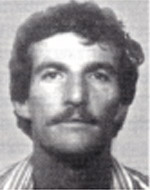Son of Gita and Shlomo, was born on April 22, 1949 in Poland. My son was 3 months old when he immigrated with his parents to Israel. They settled in Kfar Blum, a kibbutz to which my son was associated all his life. He attended elementary and high school in the kibbutz. His high school studies were agro-mechanics. In his youth he was active in the animal industry and in all the kibbutz areas. His friends told him that he was a leader from childhood, with unusual physical strength, sensitive, understanding and considerate. “He sprouted in the farm, grew in the Saifans and blossomed in cotton.” In the years 1967-1966 he completed his Gadna-Air course in Ramat David, and in the fall of 1967 he enlisted in the IDF, and for most of his years he served alternately in the Armored Corps and the Engineering Corps. Shortly after he enlisted, he took a platoon commander’s course and received the rank of Corporal in the Armored Corps. Benny continued his training in the NCO course and in the course of combat engineering officers, continuing with a course of Armored Corps Commanders, promoted to the rank of lieutenant colonel, and in 1970 he was appointed deputy commander of the Sa’ar Battalion, with the rank of lieutenant. “In 1970, Benny completed his regular army service and served in the Armored Corps in 1970. After his discharge from the army, he returned to work at Kibbutz Kfar Blum and served as the center of the cotton industry. His work in this field was told by his friends: “There are no words to describe his diligence, his strong desire to learn and carry out any action professionally and at the highest level. He knew how to manage in any situation and to radiate his authority over the staff, always in a friendly and pleasant manner. “In the Yom Kippur War, Benny was called to serve as a battalion commander for bridging tanks. For his part in this war, his commanders wrote: “He stuck conspicuously to the mission, with remarkable courage, taking care of his soldiers, a man of leadership, a remarkable officer.” After the war, he was interested in the political organizations that were then and expressed his views to promote peace. He wanted to learn and know the world, and as an expert on agricultural machines he went to work in South Africa. His superiors told him about his work there: “He is astonishing among his employers.” From South Africa, Benny went on a tour of the United States. Riding on his favorite vehicle, the motorcycle, he roamed vast areas of the United States, and with his characteristic curiosity he accumulated knowledge and experience. When he returned from his wanderings, Benny decided to organize his life. He married his girlfriend Miri, settled in Haifa and began studying at the University of Haifa and working at the Institute for Oceanographic and Limnological Research. “It seemed that there was no limit to his energy pool, his patience and the pedanticness he discovered in his work, which began as a seminar paper, and grew to the dimensions of research with findings worthy of scientific publication,” his teachers said. When they began a new study at the university, with a place for a scientific assistant, he was offered this job. He wanted to study for a master’s degree. Benny hoped to obtain a scholarship that would enable him to complete his master’s degree in the United States. On one of his teachers’ scientific skills, one of his teachers said: “If he were allowed to continue on his scientific path, my son would be transformed by his ability to perseverance, his devotion to the goal and the momentum of his work to a productive scientist of the first rank.” Benny went on to study in the IDF, and in 1981 he took a weapons course and rose to the rank of captain. On April 11, 1985, he traveled in a jeep, together with a security unit, to a tractor that was engaged in the removal of installations sabotage. The jeep hit a mine and Benny was killed. In a letter of condolence sent by the commander to the family, he said: “He was an exemplary officer, with a leadership capacity that impressed all of the officers, and above all,It is incumbent upon all the soldiers of the battalion. In a short period of time he proved himself to be a model warrior and a model commander. He showed professional ability in all areas, in the care of the individual and in the professional tasks of the entire engineering corps. “After he fell, Benny was promoted to the rank of major, who was 36 years old when he died, leaving a wife, a son 10 months old, a mother and three sisters. He was laid to rest in the cemetery in Kfar Blum, and his kibbutz published a pamphlet in his memory.
